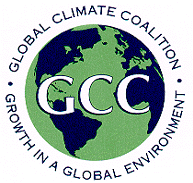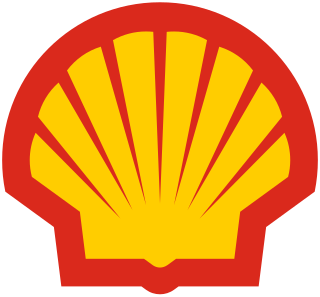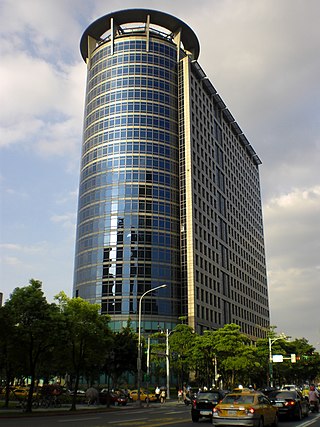
The Global Climate Coalition (GCC) (1989–2001) was an international lobbyist group of businesses that opposed action to reduce greenhouse gas emissions and engaged in climate change denial, publicly challenging the science behind global warming. The GCC was the largest industry group active in climate policy and the most prominent industry advocate in international climate negotiations. The GCC was involved in opposition to the Kyoto Protocol, and played a role in blocking ratification by the United States. The coalition knew it could not deny the scientific consensus, but sought to sow doubt over the scientific consensus on climate change and create manufactured controversy.

An oil refinery or petroleum refinery is an industrial process plant where petroleum is transformed and refined into useful products such as gasoline (petrol), diesel fuel, asphalt base, fuel oils, heating oil, kerosene, liquefied petroleum gas and petroleum naphtha. Petrochemical feedstock like ethylene and propylene can also be produced directly by cracking crude oil without the need of using refined products of crude oil such as naphtha. The crude oil feedstock has typically been processed by an oil production plant. There is usually an oil depot at or near an oil refinery for the storage of incoming crude oil feedstock as well as bulk liquid products. In 2020, the total capacity of global refineries for crude oil was about 101.2 million barrels per day.

Tesoro Corporation, known briefly as Andeavor, was a Fortune 100 and a Fortune Global 500 company headquartered in San Antonio, Texas, with 2017 annual revenues of $35 billion, and over 14,000 employees worldwide. Based on 2017 revenue, the company ranked No. 90 in the 2018 Fortune 500 list of the largest United States corporations by total revenue.

Shell USA, Inc. is the United States-based wholly owned subsidiary of Shell plc, a UK-based transnational corporation "oil major" which is amongst the largest oil companies in the world. Approximately 18,000 Shell employees are based in the U.S. Its U.S. headquarters are in Houston, Texas. Shell USA, including its consolidated companies and its share in equity companies, is one of America's largest oil and natural gas producers, natural gas marketers, fuel marketers and petrochemical manufacturers.

OMV is an Austrian multinational integrated oil, gas and petrochemical company which is headquartered in Vienna, Austria. The company is listed on the Vienna Stock Exchange. In the 2021 Forbes Global 2000, OMV Group was ranked as the 413th -largest public company in the world.

China Petroleum & Chemical Corporation (中国石油化工股份有限公司), or Sinopec, is a Chinese oil and gas enterprise based in Beijing. It is listed in Hong Kong and also trades in Shanghai.
The American Petroleum Institute (API) is the largest U.S. trade association for the oil and natural gas industry. It claims to represent nearly 600 corporations involved in production, refinement, distribution, and many other aspects of the petroleum industry.

The Pine Bend Refinery is the largest oil refinery in Minnesota, located in the Twin Cities suburbs of Rosemount and Inver Grove Heights next to southern split of U.S. Highway 52 and Minnesota State Highway 55. The refinery is notable for being the largest in the United States to be located in a state without any oil wells. Overall, it ranked 14th in the country as of 2012 by production, with a nameplate capacity of 320,000 barrels (51,000 m3) per day. The facility is owned by Flint Hills Resources (FHR), a subsidiary of Koch Industries.
The petrochemical industry is concerned with the production and trade of petrochemicals. A major part is constituted by the plastics (polymer) industry. It directly interfaces with the petroleum industry, especially the downstream sector.

Chennai Petroleum Corporation Limited (CPCL), formerly known as Madras Refineries Limited (MRL), is a subsidiary of Indian Oil Corporation Limited which is under the ownership of Ministry of Petroleum and Natural Gas of the Government of India. It is headquartered in Chennai, India. It was formed as a joint venture in 1965 between the Government of India (GOI), Amoco and National Iranian Oil Company (NIOC), having a shareholding in the ratio 74%: 13%: 13% respectively. From the grassroots stage CPCL Refinery was set up with an installed capacity of 2.5 million tonnes per year in a record time of 27 months at a cost of ₹430 million (US$5.4 million) without any time or cost overrun.
Soni Olufemi Olubunmi Oyekan is a Nigerian-American chemical engineer, inventor, entrepreneur, author, mentor and educator. Oyekan is the President and CEO of Prafis Energy Solutions, an oil refining and energy consulting company. During his career he has been involved in both research and development and management at a number of major oil companies. He holds patents and has made other contributions in the areas of chemical engineering, oil refining, and catalytic systems, including the publication of Catalytic Naphtha Reforming Process (2018).

CPC Corporation is a state-owned petroleum, natural gas, and gasoline company in Taiwan and is the core of the Taiwanese petrochemicals industry.

The fossil fuels lobby includes paid representatives of corporations involved in the fossil fuel industry, as well as related industries like chemicals, plastics, aviation and other transportation. Because of their wealth and the importance of energy, transport and chemical industries to local, national and international economies, these lobbies have the capacity and money to attempt to have outsized influence governmental policy. In particular, the lobbies have been known to obstruct policy related to environmental protection, environmental health and climate action.
Dutko Worldwide (DW), now Dutko Grayling formerly The Dutko Group, TDG or TDG Companies, is a Washington, DC based bipartisan lobbying firm that offers "comprehensive public policy management." DW's services include "Issues and opportunities assessment, Strategy Development, Crisis Management, Execution of sound public policy management programs." It identifies as its core issue areas "Appropriations, Technology, Telecommunications, Health Care, Energy, Financial Services, International Trade, Environmental Regulation, Corporate and Global Tax Policy, Sustainable Development."

Iran is an energy superpower and the petroleum industry in Iran plays an important part in it. In 2004, Iran produced 5.1 percent of the world's total crude oil, which generated revenues of US$25 billion to US$30 billion and was the country's primary source of foreign currency. At 2006 levels of production, oil proceeds represented about 18.7% of gross domestic product (GDP). However, the importance of the hydrocarbon sector to Iran's economy has been far greater. The oil and gas industry has been the engine of economic growth, directly affecting public development projects, the government's annual budget, and most foreign exchange sources.
Benjamin R. Pollner is an American businessman. He is the founder of Taurus Petroleum, based in Geneva, created in 1993, and remains its chairman and chief executive officer.

Petroleum refining in the United States in 2013 produced 18.9 million barrels per day of refined petroleum products, more than any other country. Although the US was the world's largest net importer of refined petroleum products as recently as 2008, the US became a net exporter in 2010, and in 2014 was the largest exporter and the largest net exporter of refined petroleum. As of January 2019, there were 135 operating refineries in the US, distributed among 30 states.
The petroleum industry in India dates back to 1889 when the first oil deposits in the country were discovered near the town of Digboi in the state of Assam. The natural gas industry in India began in the 1960s with the discovery of gas fields in Assam and Maharashtra. As on 31 March 2018, India had estimated crude oil reserves of 594.49 million metric tonnes (Mt) and natural gas reserves of 1339.57 billion cubic metres of natural gas (BCM).

The Washington Carbon Emissions Fee and Revenue Allocation Initiative, also known as Initiative 1631 or the Protect Washington Act was a ballot initiative that appeared on ballots in the State of Washington in the November 2018 election. The initiative proposed to reduce pollution by levying a fee on greenhouse gas emissions generated within the state of Washington, and using that revenue to support air quality and energy projects, as well as water quality and forest health initiatives. The measure failed with 56.3% of voters rejecting it. As of 2018, more had been spent in campaigning for and against the initiative than on any other ballot measure in Washington history.
John R. Kelly is an American Republican Party politician, who has represented Wood County in the West Virginia House of Delegates since 2014.











